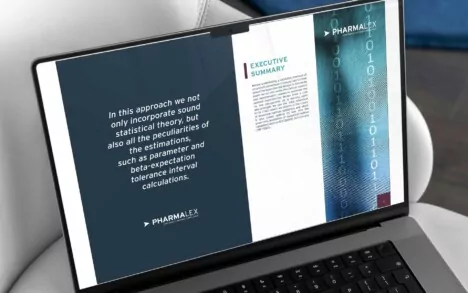CMC Statistics
In CMC statistics, GSDS has been leading the field and acted as opinion leader for the last 15 years, proposing robust and innovative statistical solutions for the development, validation, and control of processes to manufacture all types of drugs. We help our customers applying the latest guidance on processes, formulation, and assay lifecycle (e.g. FDA process validation, ICH Q1-Q14), from early development and characterization, process performance qualification (PPQ), and assay lifecycle (validation, transfer and routine manufacturing use). We have state-of-the-art expertise in Quality by Design and Analytical Quality by Design. In manufacturing sciences, we also support annual review, acceptance criteria definition, release limits and specification computations, and stability studies.
Contact our specialists to tailor a service plan
Process Development, Manufacturing and Assays
Bayesian thinking is at the heart of our approach. This provides our customers with a crystal-clear understanding of the solutions proposed and their impacts on long-term opportunities. Bayesian Statistics allows for improved conclusions from statistical models (uncertainty management, prediction, probabilities of success), but also the integration of historical data and other relevant information. For instance, it is easy to integrate the assay performances into a PPQ design or evaluation.
Our team of experts develop tailored statistical and software solutions that can speed up data analysis and reporting to an order of magnitude, while ensuring full compliance to regulatory guidance.
We offer global solutions covering the entire product lifecycle
Our solutions, consisting of core services, which are tailored to address each of your unique requirements. Extensive program management expertise is a key success factor within our service solutions.
Analytical Procedures and Bioassays
Analytical procedures and bioassays are keystones during development, from early discovery to manufacturing of drug substances and drug products, but also paramount for the analysis of blood or serum samples during pre-clinical and clinical development. Evolution of the technologies and regulatory framework puts more and more weight on the necessity of building quality in early stages of the development of these measurement systems. Knowledge and control of their behavior is paramount, due to the critical role analytical procedures and bioassays play for drug activity, process characterization, quality control, shelf-life, biosimilarity assessment, and PK/PD data.
For more than 20 years, PharmaLex has provided innovative and state-to-the-art statistical support throughout the entire lifecycle of analytical procedures and bioassays:
Lifecycle expertise
- Implementing analytical Quality by Design (aQbD) methodology (USP <1220>, ICH Q14)
- Development and optimization using Design of Experiments (DoEs)
- Strategies and methods for parallelism evaluation in parallel line and parallel curve assays
- Advanced and automated signal processing, multiplex/multispot assays (ELISA, FACS, etc.)
- Non-linear modeling
- Reportable value format optimization and justification
- Qualification and validation of analytical procedures and bioassays
- Comparability studies and technical bridging
- Evaluation of capability and uncertainty
- Control strategy and transfer
- Development of tools to treat raw data (signals) or results (dose-response modelling, parallelism, system suitability, etc.) and make flexible, real-time visualizations, and automated reporting
PPQ and Validation Manufacturing Statistics
Process performance qualification (2nd step of FDA’s Process validation guidance) confirms the process design and demonstrates that the commercial manufacturing process performs as expected. This is a crucial step before commercial distribution. PharmaLex helps to determine and justify the sampling plan based on historical data and available knowledge to ensure your product will successfully meet the authorities’ expectations. Besides this regulatory requirement, it is of high interest to determine if the manufacturing process and the product will be able to meet the required levels of quality in the future. To this aim, PharmaLex developed the robustness index, a set of metrics designed to assess scientific knowledge, development and performance data based on acquired information during development. This is fully in line with the Quality by Design (QbD) approach, which promotes a science- and risk-based approach to the development, manufacturing and control of pharmaceutical products.
Example of expertise in manufacturing validation
- Determination of PPQ sampling plan
- Support in specification setting
- Assessment of stability profile and shelf-life determination
- Bayesian predictive modeling to determine if the product will meet the quality requirement in the future, given the manufacturing process and measurement system
Continued process verification (CPV)
CPV activities are outlined as the third stage in FDA’s process validation, outlining best practices in the pharmaceutical industry.
CPV aims to keep pharmaceutical processes under control to secure final product quality. Data collection, digitalization, and statistical analyses are organized to maintain product outputs within predetermined quality specification limits.
PharmaLex’s team has 20 years of expertise in setting up strategies to detect unwanted process inconsistencies to help process owners to execute preventive measures.
PharmaLex methods include
- Design and analyses of Gage R&R studies to understand sources of variation in pharmaceutical processes
- State-to-the-art process simulation based on Bayesian methodologies
- Development of dashboard, for instance for automated annual review
- Digitalization and data governance from the machine to the LIMS, and from the LIMS to the report
Process characterization
As the first step of FDA’s Process validation (2011), manufacturers are using Quality by Design tools in order to acquire knowledge on the process and optimize it to ensure high quality and reproducibility.
Bayesian expertise in CMC
- Assess risk and criticality through historical data review, data management, advanced visualization and automated dashboards
- Design Experiments to efficiently explore multivariate relationships between Process Parameters and Critical Quality Attributes, in line with ICH Q8 requirements
- Compute the Design Space or Maximum Operating Design Region (MODR), i.e. the multivariate space of Parameters ensuring a high probability of success to meet the specifications for Critical Quality Attributes
- Train your scientific and statistical teams to understand, build, compute and report advanced solutions, to ensure compliance with respective regulatory bodies
- Propose digitalization system to help the customers populate and navigate through their data cloud, and make sense of the data
Available Resources
- 27th February 2025
FURTHER RESOURCES
Related Services
Clinical Biostatistics
PharmaLex’s Global Statistics and Data Science team brings together a wide range of experts – from study design and planning to statistical analysis, reporting and data management. Our experts help companies with complex innovative trial design, translational and precision medicine, pharmacometrics, and data science across the clinical journey.
More InfoData Strategy & Data Governance
PharmaLex’s Global Statistics and Data Science team brings together a wide range of experts – from study design and planning to statistical analysis, reporting and data management. Our experts help companies with complex innovative trial design, translational and precision medicine, pharmacometrics, and data science across the clinical journey.
More InfoDiscovery Statistics
The discovery and pre-clinical development of new drug products is a growing challenge for biopharmaceutical industry. Rapid advances in technologies help to better understand the biology of a new drug product. The vast increase in data, however, increases the risk of false discoveries leading to costly mistakes. In PharmaLex our statistical experts use appropriate statistical methods to improve reproducibility and increase the efficiency of discovery and pre-clinical studies.
More InfoOmics Data Science
Advances in omics technologies bring both opportunities and challenges in understanding disease and development of novel therapeutics. In PharmaLex, our experts have over twenty years of experience in understanding omics data – genomics, transcriptomics, proteomics, and metabolomics, among others – and uncovering insights to inform discovery and development of medicines.
More InfoContact Us
Contact Form
Complete this form to stay in contact with us.
Global Approach
PharmaLex has 60+ offices in 32 countries serving more than 1600 satisfied clients worldwide. Search your nearest office.






